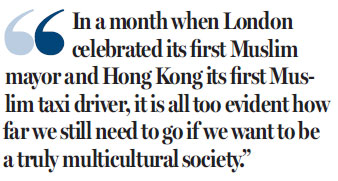The SAR has to 'add oil' if it wants to be a truly multicultural society
Updated: 2016-06-07 07:41
By Andrew Mitchell(HK Edition)
|
|||||||||
There has been a lot of publicity recently about all the Hong Kong English words that have made it into the latest edition of the Oxford English Dictionary (OED). The words include a number of Cantonese loanwords (e.g. char siu and dai pai dong), some pidgin English terms (e.g. lucky money and milk tea), and even an example of colonial English (shroff).
These latest additions to the OED are part of a rich heritage of Hong Kong English. They are also testimony to Hong Kong's continuing influence in the English-speaking world.
As one might expect, Hong Kong English is something of an international hodgepodge, with its predominantly Chinese characteristics complemented by diverse influences from around the former colonial world. The word shroff, for example, comes from the Hindi saraf, while nullah is the word for a small river in Urdu and Punjabi, godown is an adaptation of the Malay word gudang, and amah is derived from the Portuguese ama, meaning nurse or nanny.
Hong Kong English continues to flourish in post-colonial Hong Kong, with some popular local expressions increasingly used in English rather than the original Cantonese. One example is "add oil", a direct translation of gayau, a term of encouragement meaning keep going.
However, the multiculturalism inherent in Hong Kong English is notably lacking in much of Hong Kong society today. Although ethnic minorities represent over 6 percent of the Hong Kong population, according to the 2011 census, they currently make up only 2 percent of civil servants and 0.4 percent of government board members. Moreover not one of the eight chairmen of the Equal Opportunities Commission, past or present, has come from an ethnic minority.

One of the main barriers facing ethnic minorities here is a lack of proficiency in Chinese language skills, especially reading and writing. This is a consequence of the local education system, which until recently did not cater to the needs of non-Chinese-speaking (NCS) students in Chinese-medium (CMI) schools. As a result most ethnic-minority children here were forced to study in "designated schools", which effectively segregated them from Chinese-speaking students and condemned them to a substandard level of Chinese.
The Chief Executive sought to address the problem by overseeing the disbanding of designated schools in 2013 and the introduction of a Chinese Language Curriculum Second Language Learning Framework in 2014. The new framework is designed to enable NCS students to learn Chinese on a par with their Chinese-speaking counterparts. However, due to the fragmented nature of the local education system, the Education Bureau cannot simply impose the framework on Hong Kong schools; all it can do is offer financial incentives and professional support to any CMI schools that are willing to admit NCS students. As a result many ethnic-minority children today still study in what were formerly designated schools.
The situation may improve, however, with the implementation of the "free quality kindergarten education" initiative announced in this year's Policy Address. The initiative, which will come into effect in the 2017-18 school year, will enable local kindergartens admitting eight or more NCS students to receive a grant equal to the salary of one teacher. Hopefully this will persuade more local kindergartens to accept NCS students, resulting in a genuinely integrated kindergarten system that prepares ethnic-minority children for entry into CMI primary schools.
Clearly, though, this is a long-term solution. So, in the short term, the government needs to raise awareness of all the issues currently facing ethnic minorities here, from institutional racism to inter-generational poverty. It also needs to promote a more positive image of ethnic minorities, emphasizing that many of them have roots in Hong Kong that stretch back several generations (more than can be said of many of their Chinese counterparts, mostly descendants of immigrants from the mainland who arrived in the city in 1950-70) and that their relative youth is a potential asset for our aging population.
In a month when London celebrated its first Muslim mayor and Hong Kong its first Muslim taxi driver, it is all too evident how far we still need to go if we want to be a truly multicultural society. Interestingly the father of Sadiq Khan, the new mayor of London, was a bus driver, so in terms of diversity we can say that Hong Kong is about a generation behind London. This means that if we really are serious about being Asia's World City, we still have a lot of work to do. So add oil, everyone!
|
Andrew Mitchell The author is an educationist, commentator and the director of Oxford Blue, a company providing English language services in Hong Kong. |
(HK Edition 06/07/2016 page1)
